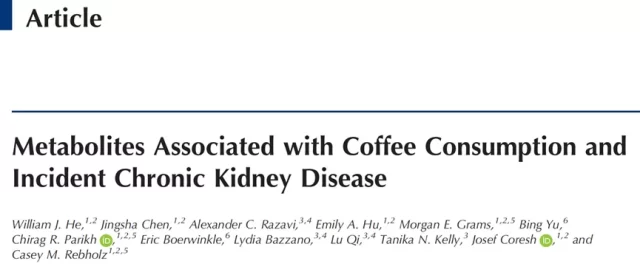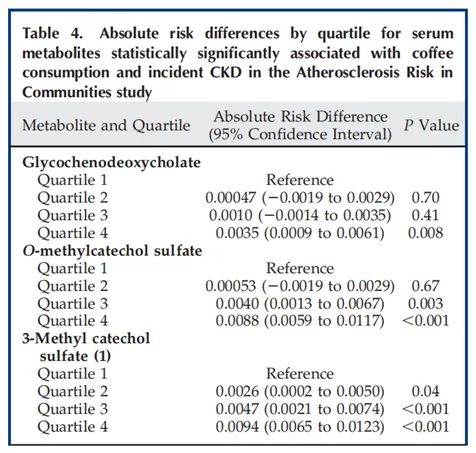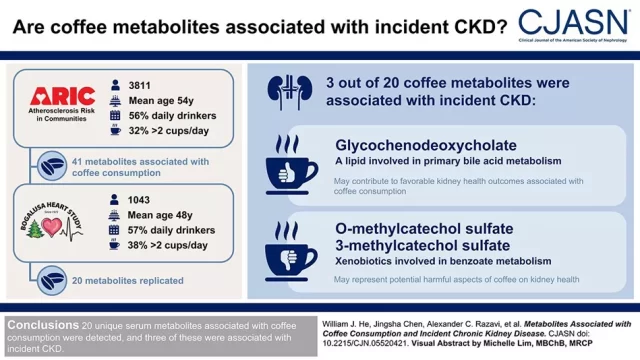Drinking coffee increases the levels of two kidney-damaging substances!
- Normal Liver Cells Found to Promote Cancer Metastasis to the Liver
- Nearly 80% Complete Remission: Breakthrough in ADC Anti-Tumor Treatment
- Vaccination Against Common Diseases May Prevent Dementia!
- New Alzheimer’s Disease (AD) Diagnosis and Staging Criteria
- Breakthrough in Alzheimer’s Disease: New Nasal Spray Halts Cognitive Decline by Targeting Toxic Protein
- Can the Tap Water at the Paris Olympics be Drunk Directly?
Drinking coffee increases the levels of two kidney-damaging substances!
- Should China be held legally responsible for the US’s $18 trillion COVID losses?
- CT Radiation Exposure Linked to Blood Cancer in Children and Adolescents
- FDA has mandated a top-level black box warning for all marketed CAR-T therapies
- Can people with high blood pressure eat peanuts?
- What is the difference between dopamine and dobutamine?
- How long can the patient live after heart stent surgery?
Drinking coffee increases the levels of two kidney-damaging substances!
A 24-year study found that drinking coffee changes the levels of blood metabolites, and 3 metabolites are associated with chronic kidney disease丨Clinical discovery
Coffee is really important in human living.
First of all, if you are slack at work and have no energy when you are playing all night, you can recharge with a cup of coffee, and renew your life for inspiration and vitality.
Secondly, a large number of studies have shown that drinking coffee in moderation can help reduce the risk of dementia, cardiovascular disease, and fatty liver [1], which makes coffee a real life-sustaining drink.
But everything pays attention to pros and cons. You can’t eat a lot of vitamin gummies every day, right?
Recently, Josef Coresh and his colleagues from Johns Hopkins University in the United States found that drinking coffee is associated with changes in the levels of various metabolites in our blood based on metabolomic analysis .
Among them, changes in the levels of one metabolite are beneficial to kidney health, while changes in the levels of the other two metabolites are significantly associated with an increased risk of chronic kidney disease (CKD) .
The article was published in the Journal of the American Society of Clinical Nephrology [2].

Screenshot of the paper’s homepage
In the past few years, the beverage industry has become more and more serious, such as adding ingredients, sugar control, special packaging, etc., and even has its own exclusive bgm (you love me, I love you) .
Singularity Cake looked at the drink in his hand that was no different from porridge and seemed to belong to the milk tea category and fell into contemplation. He bought another cup of bubble American to try it. After tasting it, people almost died (it’s really difficult to adapt to this taste… …) .
There is growing evidence that beverages have an effect on kidney health [3].
Excessive or inappropriate drinking habits may cause a great burden on the kidneys, and many studies have shown that moderate coffee consumption (3-8 cups of regular coffee per day, 8 ounces ≈ 227 g per cup) can effectively reduce the risk of CKD [4] -6].
However, due to the complex chemical composition of coffee, there are still many doubts about the effect of coffee on the kidneys.
So Coresh set out to explore the link between coffee and CKD risk, starting with changes in metabolite levels in the blood .
They successively obtained blood samples from participants from two independent study cohorts and performed metabolomic analyses.
Among them, a total of 3811 participants from the Atherosclerosis Risk Study in the Community (ARIC) were included, with an average age of 54 years, 60% were women, and 28% were smokers [3]; a total of 3811 participants from Bogaloosa Heart The study (BHS) included 1043 participants with a mean age of 45 years, 60% were women, and 17% were smokers [7].
Among the participants from ARIC and BHS, 32% and 38% drank more than two cups of coffee per day, respectively, and 24% and 5% drank one cup per day.
The rest of the participants drank coffee infrequently (one cup ≈ 227 g, regular coffee).
Additionally, 31% of ARIC-derived participants (n=1180) had confirmed CKD during 24 years of follow-up.
The results of blood metabolomic analysis showed that a total of 20 metabolite level changes in blood samples from both cohorts were significantly associated with coffee intake.
Among them, 18 metabolite levels were positively correlated with coffee intake, and 2 metabolite levels were negatively correlated .
Next, the researchers further analyzed the association between these 20 metabolites and CKD risk.
They found that chenodeoxycholate (glycohenodeoxycholate) , o-methyl catechol sulfate (O-methyl catechol sulfate) , 3 -methyl catechol sulfate (3-methyl catechol sulfate) three metabolites Elevated levels are associated with an increased risk of developing CKD .
Although the absolute risk increase in the highest quartile was not much compared with the lowest quartile (0.0035 vs 0.0088 vs 0.0094), it was statistically significant (P=0.008, <0.001, <0.001).

Not much, but significant, still can’t be ignored
Specifically, chenodeoxycholic acid is one of the important components of primary bile acids secreted by the human liver, and its level changes were negatively correlated with coffee intake , suggesting that coffee drinking may have potentially beneficial effects on the kidneys .
However, the levels of two exogenous compounds, o-methylcatechol sulfate and 3-methylcatechol sulfate, which are metabolites of the preservative paraben, vary with coffee intake. positive correlation .
This also means that drinking coffee may have non-negligible potential harm to the kidneys .

Good or bad, let’s make it clear
Overall, Coresh and colleagues’ analysis from a metabolite perspective reveals what’s at stake between coffee drinking and chronic kidney disease risk .
They found that drinking coffee induced a drop in blood levels of chenodeoxycholic acid, which may have protective effects on the kidneys.
But surprisingly, drinking coffee also led to increased blood levels of o-methylcatechol sulfate and 3-methylcatechol sulfate, which were significantly associated with an increased risk of chronic kidney disease .
As mentioned at the beginning, the chemical composition of coffee is complex, and its impact on health should be analyzed from multiple perspectives.
It does not seem feasible to make a final decision. Knowing many “curative effects”, “side effects” must also be found out.
Since the metabolites in the blood can reflect the consumption and metabolism of food, this may help to further explore the specific mechanism of coffee’s effect on the kidney in the future, and prevent kidney disease through diet.
References:
[1] https://www.nejm.org/doi/full/10.1056/NEJMra1816604
[2] https://cjasn.asnjournals.org/content/16/11/1620.long
[3] Hu EA, Anderson CAM, et al, CRIC Study Investigator: A healthy beverage score and risk of chronic kidney disease progression, incident cardiovascular disease, and all-cause mortality in the chronic renal insufficiency cohort. Curr Dev Nutr 4: nzaa088 , 2020
[4]CM: Coffee consumption and incident kidney disease: Results from the atherosclerosis risk in communities (ARIC) study. Am J Kidney Dis 72: 214–222, 2018
[5] Kennedy OJ, Roderick P, Poole R, Parkes J: Coffee and kidney disease. Int J Clin Pract 71: e12980, 2017
[6] Jhee JH, Nam KH, An SY, Cha MU, Lee M, Park S, Kim H, Yun HR, Kee YK, Park JT, Chang TI, Kang EW, Yoo TH, Kang SW, Han SH: Effects of coffee intake on incident chronic kidney disease: A community-based prospective cohort study. Am J Med 131: 1482–1490.e3, 2018
[7]Berenson GS, Bogalusa Heart Study Investigators: Bogalusa Heart Study: A long-term community study of a rural biracial (black/white) population. Am J Med Sci 322: 293–300, 2001
Drinking coffee increases the levels of two kidney-damaging substances!
(source:internet, reference only)
Disclaimer of medicaltrend.org
Important Note: The information provided is for informational purposes only and should not be considered as medical advice.



